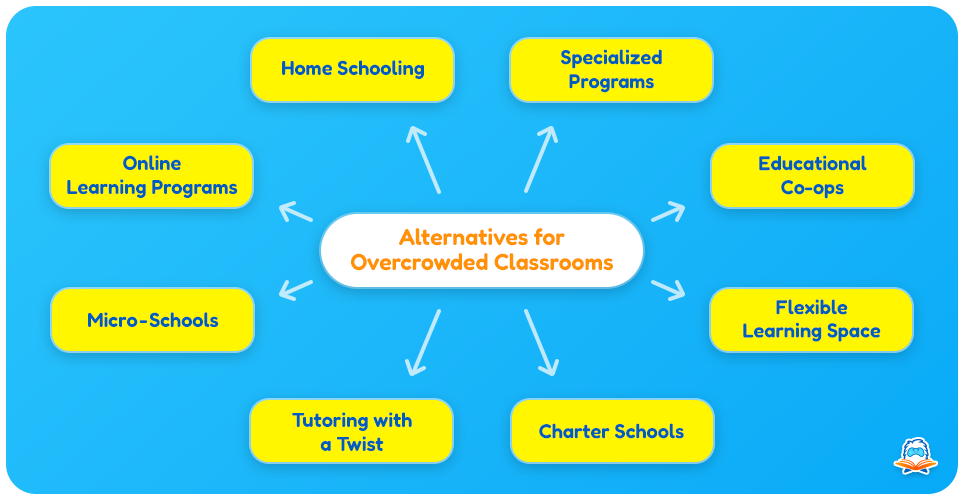Overcrowded Classrooms: How to Provide Effective Alternatives for Your Child’s Education
Overcrowded classrooms can significantly hinder a child’s learning experience and academic performance. However, the knowledge that there are several effective alternatives to traditional education can provide parents with a sense of relief. These alternatives can offer your child a more personalized, engaging, and enjoyable learning environment.
One innovative and effective option is KidsAge, a platform that focuses on age-appropriate learning experiences tailored to your child’s developmental needs. With various resources and activities designed specifically for different age groups, KidsAge offers a nurturing environment that encourages learning through play and exploration.
Here are some additional ideas to enhance your child’s educational journey, including the value of age-appropriate experiences:

- Homeschooling
Tailoring your child’s education allows for flexibility in the curriculum. Although homeschooling might sound daunting, several resources make the journey smoother. Many websites guide parents through the entire homeschooling process from top to bottom, all free of cost. Parents can also integrate gamified learning methods and choose age-appropriate materials, making lessons more interactive and enjoyable. - Online Learning Programs
Many online platforms, including KidsAge, offer gamified courses that engage students with interactive content, quizzes, and rewards. These programs cater to different age groups, allowing children to learn independently while developing critical thinking skills in a fun environment. Utilizing these programs will ensure your child is well-rounded in areas they may have missed during regular class hours. - Micro-Schools
Small, community-based schools focus on innovative teaching methods, such as game-based learning, which align with children’s developmental stages. By maintaining smaller class sizes, teachers can foster closer relationships with their students, allowing for a better understanding of individual learning styles. This enables them to create customized and engaging activities that make learning enjoyable and effectively promote critical thinking and problem-solving skills, ultimately nurturing a love for learning in each child. - Tutoring with a Twist
One-on-one tutoring incorporating gamified learning techniques can significantly enhance the educational experience by making it both practical and enjoyable. Tutors can use various games— quizzes and interactive challenges—to reinforce key concepts engagingly. This approach caters to different learning styles, keeps students motivated, and fosters a positive tutor-student relationship, transforming learning into a fun and rewarding adventure while solidifying knowledge retention. - Educational Co-ops
Joining local cooperative groups can greatly enhance your child’s education while fostering a supportive community for parents. These co-ops allow parents to share resources and teaching responsibilities, often emphasizing fun, game-based learning that resonates with children at various developmental levels. This interactive approach encourages active participation and critical thinking while promoting collaborative problem-solving among peers. Ultimately, participating in a co-op provides educational enrichment for children and valuable connections among parents, creating a mutually beneficial environment for all involved. - Charter Schools
When searching for charter schools, consider those that utilize innovative teaching methods, such as gamified learning experiences tailored to specific age groups. These schools create engaging and interactive environments that motivate students while catering to diverse learning styles through unique curriculum options. Programs may include project-based learning and personalized paths, focusing on critical thinking and collaboration skills. These charter schools prepare students for success in an ever-changing world by prioritizing creativity and forward-thinking approaches. - Specialized Programs
Programs that focus on specific interests like STEM, the arts, or languages provide engaging and enriching experiences for children. These programs often incorporate hands-on activities that make complex concepts fun and accessible. For instance, STEM programs may involve experiments and coding, while arts programs encourage creativity through various mediums. Organizations like KidsAge exemplify this by creating dynamic learning environments that captivate and inspire students. Parents can foster a love of learning that promotes confidence and continuous skill development by choosing programs tailored to their children’s passions. - Flexible Learning Spaces
For those who prefer traditional schooling, it’s essential to seek out institutions that offer flexible learning environments and a variety of teaching methods. Look for schools incorporating project-based learning, which encourages hands-on collaboration and real-world application of knowledge, and game-based learning initiatives that make education more engaging. These diverse approaches cater to different age groups and learning styles, fostering creativity, critical thinking, and a genuine love for learning in students.
Regardless of the educational path chosen, parents can rest assured that their children will have ample opportunities to socialize. Clubs, extracurricular activities, or community programs incorporating games and social learning can support teamwork and age-appropriate interaction, providing a well-rounded educational experience.

By exploring alternatives like KidsAge and these additional options, you can help your child thrive academically and socially, transforming their educational journey into an adventurous and enjoyable experience. Embracing learning methods that align with your child’s developmental stage can make all the difference.
Always keep an open line of communication with your child about their educational needs and interests to ensure the best fit for their learning journey. Start by researching these alternatives and discussing them with your child. The more you know, the better equipped you’ll be to make the right decision for your child’s education.



